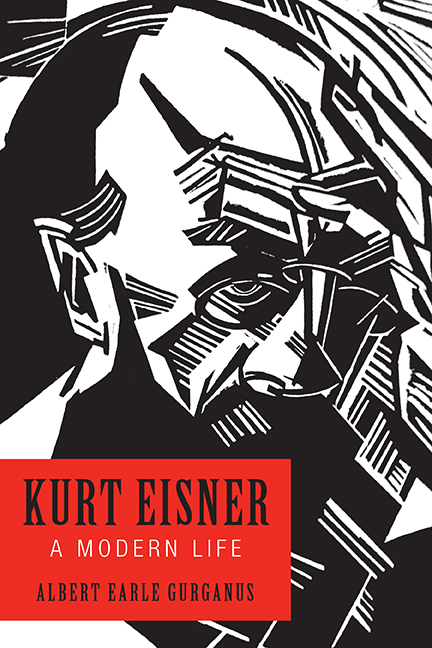Book contents
- Frontmatter
- Dedication
- Contents
- Acknowledgments
- Introduction
- 1 A Novel's Suffering Hero: A Youth in Berlin (1867–1889)
- 2 Aristocratize the Masses: From Berlin to Frankfurt to Marburg (1890–1893)
- 3 Refuge of All Idealists: Through Cohen to Kant toward Marx (1893–1896)
- 4 Dictatorial Megalomania: Lèse Majesté and Plötzensee Prison (1896–1898)
- 5 Making the Leap: Back to Berlin as a Social Democrat (1898–1900)
- 6 No Idle Dreamer: At the Helm of Vorwärts (1900–1902)
- 7 My Life's Purpose: Molding the Readership (1902–1903)
- 8 Never ... a Less Fruitful Scholastic Debate: Intramural Strife—Evolution vs. Revolution (1903–1905)
- 9 Revolutionizing Minds: The Scorched Middle Ground (1905)
- 10 The Complete Parity of My Experiences: From Exile to Nuremberg (1905–1907)
- 11 The Most Genuine and Fruitful Radicalism: Taking the Lead at the Fränkische Tagespost (1907–1908)
- 12 So Suspect a Heretic, as Surely I Am: New Bearings in North Bavaria (1908)
- 13 Dear Little Whore: Personal and Professional Turmoil (1909)
- 14 To Find a Lost Life: From Nuremberg to Munich (1909–1910)
- 15 Something of a Party Offiziosus in Bavaria: Political Editor at the Münchener Post (1910–1911)
- 16 At Peace with Myself: Resettling into Family Life (1912–1913)
- 17 The Powerlessness of Reason: The World War Erupts (1914)
- 18 Wretched Superfluity: Divided Loyalties (1915–1916)
- 19 War for War's Sake: Political Alienation and Realignment (1916–1917)
- 20 The Most Beautiful Days of My Life: Leading the Opposition (1917–1918)
- 21 Our Power to Act Now Grows: From Prisoner to Premier (1918)
- 22 The Terror of Truth: Forging the Republic, Combatting Reaction (1918)
- 23 The Fantasies of a Visionary: Martyr of the Revolution (1918–1919)
- 24 Now Dead, as It Stands: Outcomes and Legacy (1919–2017)
- Abbreviations
- Notes
- Sources and References
- Index
16 - At Peace with Myself: Resettling into Family Life (1912–1913)
Published online by Cambridge University Press: 15 August 2018
- Frontmatter
- Dedication
- Contents
- Acknowledgments
- Introduction
- 1 A Novel's Suffering Hero: A Youth in Berlin (1867–1889)
- 2 Aristocratize the Masses: From Berlin to Frankfurt to Marburg (1890–1893)
- 3 Refuge of All Idealists: Through Cohen to Kant toward Marx (1893–1896)
- 4 Dictatorial Megalomania: Lèse Majesté and Plötzensee Prison (1896–1898)
- 5 Making the Leap: Back to Berlin as a Social Democrat (1898–1900)
- 6 No Idle Dreamer: At the Helm of Vorwärts (1900–1902)
- 7 My Life's Purpose: Molding the Readership (1902–1903)
- 8 Never ... a Less Fruitful Scholastic Debate: Intramural Strife—Evolution vs. Revolution (1903–1905)
- 9 Revolutionizing Minds: The Scorched Middle Ground (1905)
- 10 The Complete Parity of My Experiences: From Exile to Nuremberg (1905–1907)
- 11 The Most Genuine and Fruitful Radicalism: Taking the Lead at the Fränkische Tagespost (1907–1908)
- 12 So Suspect a Heretic, as Surely I Am: New Bearings in North Bavaria (1908)
- 13 Dear Little Whore: Personal and Professional Turmoil (1909)
- 14 To Find a Lost Life: From Nuremberg to Munich (1909–1910)
- 15 Something of a Party Offiziosus in Bavaria: Political Editor at the Münchener Post (1910–1911)
- 16 At Peace with Myself: Resettling into Family Life (1912–1913)
- 17 The Powerlessness of Reason: The World War Erupts (1914)
- 18 Wretched Superfluity: Divided Loyalties (1915–1916)
- 19 War for War's Sake: Political Alienation and Realignment (1916–1917)
- 20 The Most Beautiful Days of My Life: Leading the Opposition (1917–1918)
- 21 Our Power to Act Now Grows: From Prisoner to Premier (1918)
- 22 The Terror of Truth: Forging the Republic, Combatting Reaction (1918)
- 23 The Fantasies of a Visionary: Martyr of the Revolution (1918–1919)
- 24 Now Dead, as It Stands: Outcomes and Legacy (1919–2017)
- Abbreviations
- Notes
- Sources and References
- Index
Summary
THE REICHSTAG CAMPAIGN OF 1912, Wilhelmine Germany's last national election, was hailed as a great victory for the Social Democratic Party and a resounding defeat for Weltpolitik. Winning four and a quarter million votes on the first ballot, over a third of the immense turnout, the party eventually claimed 110 of the 397 seats after runoffs, a gain of 67 from the 1907 debacle, 19 more than the second-place Center Party. For the first time since the founding of the Reich, Social Democrats were the dominant deputation, having won 27. percent of the mandates. In the days leading up to the first polling on Friday, 12 January, Eisner and fellow functionaries fanned out across South Bavaria to rally the rank and file. On the morning of the sixth he spoke in Prien, later the same afternoon in Endorf, and the following day in Kolbermoor. On the eve of the election the party's two candidates in Munich, Sebastian Witti and Georg von Vollmar, addressed crowds at beer halls in their respective districts. The banner of Saturday's edition of the Münchener Post, circulated late Friday afternoon, urged readers to the polls yet before the 19:00 close.
In its combined Sunday/Monday issue the Post reported the heady results. Vollmar had been reelected in Munich's second district; Witti was in a runoff with Left Liberal Georg Kerschensteiner in the first. Nationally, Social Democratic candidates appeared to have won 67 districts outright and advanced to the second round in 120 others. In runoffs in which no Social Democrat remained on the ballot, the party's voters were poised to sway the outcome to best advantage. The lesson, Eisner wrote, was clear: “Whoever allies himself with Prussian Junker reaction is forever lost.” The Black-Blue Bloc of Center and Conservatives was smashed. Furious agitation preceded the second round of balloting. On the seventeenth Eisner targeted proponents of protective agricultural tariffs and low wages. On the twenty-third an editorial on the Reichstag's role in international affairs demanded the “democratization and parliamentarization of foreign policy” in the wake of Bethmann's near-disastrous Moroccan caper.
- Type
- Chapter
- Information
- Kurt EisnerA Modern Life, pp. 289 - 302Publisher: Boydell & BrewerPrint publication year: 2018



